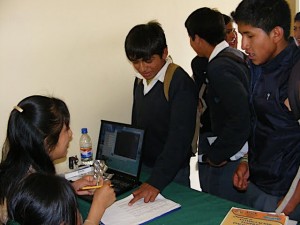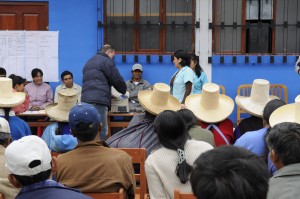 Iron Deficiency, Anemia and School Performance
Iron Deficiency, Anemia and School Performance
The project goals are to measure the effect of iron pills and access to information and communication technology on educational outcomes of children in high-altitude rural Peru. Through a randomized design, the study varied both the encouragement and intensity of the treatments in order to tease out the mechanisms through which intervention uptake is highest.
Is there a Nutrient-Based Poverty Trap in Developing Countries? Iron Deficiency and Human Capital Attainment in Rural Peru
with Alberto Chong, Isabelle Cohen, Alberto Nakasone and Maximo Torero..
Collaborating Organization: International Food Policy Research Institute (IFPRI)
Funding Organization: Inter-American Development Bank (IADB)
Land Titling
Property rights are often cited as a prerequisite for economic development, and in 1996, Peru issued over 1.2 million property titles to urban squatters, significantly enhancing property rights. Taking advantage of this initiative, this project studied the relationship between property rights and credit access, labor supply, crop choice, and fertility.
Entitled to Work: Urban Property Rights and Labor Supply in Peru
Do Property Titles Increase Credit Access Amongst the Urban Poor? Evidence from a Nationwide Titling Program
with Maximo Torero
Property Rights and Investments in Urban Slums
Globalization, Crop Choice and Property Rights in Rural Peru. 1994-2004
with Alfred J. Field
Fertility Responses to Land Titling: The Roles of Ownership Security and the Distribution of Household Assets (unpublished manuscript)
Collaborating Organizations: PETT and COFOPRI
Funding Organizations: USAID, Inter-American Development Bank (IADB) and the World Bank
Training Local Leaders to Prevent Gender-based Violence in Their Communities (fieldwork in progress)
Gender-based violence (GBV) against women poses a significant challenge for policy makers and researchers. Despite the fact that one in three women are affected by GBV globally, there has been little rigorous research on the efficacy of interventions that aim to reduce and prevent GBV. To address this, the Peruvian Ministry of Women and Vulnerable Populations (MOW) designed a program, Leaders in Action, which teaches local leaders about gender-based violence issues, including how to prevent it and identify cases. Leaders in Action is a key component of MOW’s National Plan against Gender-Based Violence. Its evaluation is result of a collaboration between IPA, J-PAL and the MOW that started in 2016, and led to two workshops designed to strengthen the technical capabilities of MOW staff around impact evaluations and to inform policy in the area. Since then, IPA has been working with the MOW to lay the groundwork for a randomized controlled trial to evaluate Leaders in Action and to a plan on how to use the evidence generated to reduce gender-based violence in Peru.
Collaborating Organizations: Ministry of Women and Vulnerable Populations (MOW) and Innovations for Poverty Action (IPA)
Funding Organizations: GPI J-PAL; CVI J-PAL
